- Home
- Thornton Wilder
The Bridge of San Luis Rey Page 8
The Bridge of San Luis Rey Read online
Page 8
The addition of the Archbishop to the suppers was so successful that Don Andrés began to think of new names. He had grown increasingly dependent upon Uncle Pio, but waited until Camila should propose his inclusion of her own accord. And in due time Uncle Pio brought with him that courser of the seas, the Captain Alvarado. Generally [88] the reunion had been several hours under way before Camila was able to join them after her performance at the theatre. She would arrive towards one o’clock, radiant and bejewelled and very tired. The four men received her as they would a great queen. For an hour or so she would carry the conversation, but gradually reclining more and more against Don Andrés’ shoulder she would follow the talk as it flitted from one humorous lined face to the other. All night they talked, secretly comforting their hearts that longed always for Spain and telling themselves that such a symposium was after the manner of the high Spanish soul. They talked about ghosts and second-sight, and about the earth before man appeared upon it and about the possibility of the planets striking against one another; about whether the soul can be seen, like a dove, fluttering away at the moment of death; they wondered whether at the second coming of Christ to Jerusalem, Peru would be long in receiving the news. They talked until the sun rose, about wars and kings, about poets and scholars, and about strange countries. Each one poured into the conversation his store of wise sad anecdotes and his dry regret about the race of men. The flood of golden light struck across the Andes and entering the great window fell upon the piles of fruit, the stained brocade upon the table, and the sweet thoughtful forehead of the Perichole as she lay sleeping against the sleeve of her protector. There would ensue a long pause, no one wishing to make the first move to go, and the glances of them all would rest upon this strange beautiful bird who lived among them. But Uncle Pio’s glance had been upon her all night, a quick glance from his black eyes, full of tenderness and anxiety, resting on the great secret and reason of his life.
But Uncle Pio never ceased watching Camila. He divided [89] the inhabitants of this world into two groups, into those who had loved and those who had not. It was a horrible aristocracy, apparently, for those who had no capacity for love (or rather for suffering in love) could not be said to be alive and certainly would not live again after their death. They were a kind of straw population, filling the world with their meaningless laughter and tears and chatter and disappearing still lovable and vain into thin air. For this distinction he cultivated his own definition of love that was like no other and that had gathered all its bitterness and pride from his odd life. He regarded love as a sort of cruel malady through which the elect are required to pass in their late youth and from which they emerge, pale and wrung, but ready for the business of living. There was (he believed) a great repertory of errors mercifully impossible to human beings who had recovered from this illness. Unfortunately there remained to them a host of failings, but at least (from among many illustrations) they never mistook a protracted amiability for the whole conduct of life, they never again regarded any human being, from a prince to a servant, as a mechanical object. Uncle Pio never ceased watching Camila because it seemed to him that she had never undergone this initiation. In the months that followed her introduction to the Viceroy he held his breath and waited. He held his breath for years. Camila bore the Viceroy three children, yet remained the same. He knew that the first sign of her entrance into the true possession of the world would be the mastery of certain effects in her acting. There were certain passages in the plays that she would compass some day, simply, easily, and with secret joy, because they alluded to the new rich wisdom of her heart; but her treatment of such passages became more and more cursory, not to say embarrassed. He presently saw that [90] she had tired of Don Andrés and had returned to a series of furtive love-affairs with the actors and matadors and merchants of the town.
She became more and more impatient of acting and another parasite found its way into her mind. She wanted to be a lady. She slowly contracted a greed for respectability and began to refer to her acting as a pastime. She acquired a duenna and some footmen and went to church at the fashionable hours. She attended the prize days at the University and appeared among the donors of the great charities. She even learned to read and write a little. Any faint discrimination against her as a bohemian she challenged with fury. She led the Viceroy a horrible life with her passion for concessions and her gradual usurpation of privileges. The new vice displaced the old and she became noisily virtuous. She invented some parents and produced some cousins. She obtained an undocumented legitimatization of her children. In society she cultivated a delicate and languid magdalenism, as a great lady might, and she carried a candle in the penitential parades, side by side with ladies who had nothing to regret but an outburst of temper and a furtive glance into Descartes. Her sin had been acting and everyone knows that there were even saints who had been actors,—there was Saint Gelasius and Saint Genesius and Saint Margaret of Antioch and Saint Pelagia.
There was a fashionable watering place in the hills not far from Santa María de Cluxambuqua. Don Andrés had travelled in France and had thought to build himself a little mock Vichy; there was a pagoda, some drawing-rooms, a theatre, a little arena for bull-fights and some French gardens. Camila’s health had never known a shadow, but she built herself a villa in the vicinity and [91] sipped the hateful waters at eleven o’clock. The Marquesa de Montemayor has left a brilliant picture of this opéra bouffe paradise with the reigning divinity parading fierce sensitiveness along the avenues of powdered shell and receiving the homage of all those who could not afford to offend the Viceroy. Doña María draws a portrait of this ruler, stately and weary, gambling all through the night in sums that would have raised another Escurial. And beside him she sets the portrait of his son, Camila’s little Don Jaime. Don Jaime, at seven years, was a rachitic little body who seemed to have inherited not only his mother’s forehead and eyes, but his father’s liability to convulsions. He bore his pain with the silent bewilderment of an animal, and like an animal, he was mortally ashamed when any evidences of it occurred in public. He was so beautiful that the more trivial forms of pity were hushed in his presence and his long thoughts about his difficulties had given his face a patient and startling dignity. His mother dressed him in garnet velvet, and when he was able he followed her about at a distance of several yards, extricating himself from the ladies who tried to detain him in conversation. Camila was never cross to Don Jaime and she was never demonstrative. When the sun was shining the two could seen walking along those artificial terraces in silence, Camila wondering when the felicity would begin that she had always associated with social position, Don Jaime rejoicing merely in the sunlight and anxiously estimating approach of a cloud. They looked like figures that strayed there from some remote country, or out of an old ballad, that had not yet learned the new language and had not yet found any friends.
Camila was about thirty when she left the stage and it [92] required five years for her to achieve her place in society. She finally became more stout, though her head seemed to grow more beautiful every year. She took to overdressing and the floors of the drawing-rooms reflected a veritable tower of jewels and scarves and plumes. Her face and hands were covered with a bluish powder against which she drew an irritable mouth in scarlet and orange. The almost distraught fury of her temper was varied by the unnatural sweetness of her address in the company of the dowagers. In the earliest stages of her progress upward she had intimated to Uncle Pio that he was not to be seen with her in public, but finally she became impatient even of his discreeter visits. She conducted the interviews with formality and evasion. Her eyes never crossed his and she angled for pretexts to quarrel with him. Still he ventured out once a month to try her patience and when the call had become impossible he would climb the stairs and finish the hour among her children.
One day he arrived at her villa in the hills and, through her maid, begged for an opportunity to talk with her. He was told that she would see him in the French
gardens a little before sunset. He had come up from Lima on a strange sentimental impulse. Like all solitary persons he had invested friendship with a divine glamour: he imagined that the people he passed on the street, laughing together and embracing when they parted, the people who dined together with so many smiles,—you will scarcely believe me, but he imagined that they were extracting from all that congeniality great store of satisfaction. So that suddenly he was filled with the excitement of seeing her again, of being called “Uncle Pio,” and of reviving for a moment the trust and humour of their long vagabondage.
[93] The French Gardens were at the southern end of the town. Behind them rose the higher Andes and before them there was a parapet overlooking a deep valley and overlooking wave after wave of hills that stretched toward the Pacific. It was the hour when bats fly low and the smaller animals play recklessly underfoot. A few solitaries lingered about the gardens, gazing dreamily into the sky that was being gradually emptied of its colour, or leaned upon the balustrade and looked down into the valley, noting in which village a dog was barking. It was the hour when the father returns home from the fields and plays for a moment in the yard with the dog that jumps upon him, holding his muzzle closed or throwing him upon his back. The young girls look about for the first star to fix a wish upon it, and the boys grow restless for supper. Even the busiest mother stands for a moment idle-handed, smiling at her dear and exasperating family.
Uncle Pio stood against one of the chipped marble benches and watched Camila coming towards him:
“I am late,” she said. “I am sorry. What is it you wish to say to me?”
“Camila,—” he began.
“My name is Doña Micaela.”
“I do not wish to offend you, Doña Micaela, but when you let me call you Camila for twenty years, I should think—”
“Oh, do as you like. Do as you like.”
“Camila, promise me that you will listen to me. Promise me that you will not run away at my first sentence.”
At once she burst out with unexpected passion: “Uncle Pio, listen to me. You are mad if you think you can make me return to the theatre. I look back at the theatre with [94] horror. Understand that. The theatre! The theatre, indeed! The daily payment of insults in that filthy place. Understand that you are wasting your time.”
He answered gently: “I would not have you come back if you are happy with these new friends.”
“You don’t like my new friends, then?” she answered quickly. “Whom do you offer me in their stead?”
“Camila, I only remember …”
“I will not be criticized. I don’t want any advice. It will be cold in a moment, I must go back to my house. Just give me up, that’s all. Just put me out of your mind.”
“Dear Camila, don’t be angry. Let me talk to you. Just suffer me for ten minutes.”
He did not understand why she was weeping. He did not know what to say. He talked at random: “You never even come to see the theatre, and they all notice it. The audiences are falling away now, too. They only put on the Old Comedy twice a week; all the other nights there are those new farces in prose. All is dull and childish and indecent. No one can speak Spanish any more. No one can even walk correctly any more. On Corpus Christi Day they gave Belshazzar’s Feast where you were so wonderful. Now it was shameful.”
There was a pause. A beautiful procession of clouds, like a flock of sheep, was straying up from the sea, slipping up the valleys between the hills. Camila suddenly touched his knee, and her face was like her face twenty years before: “Forgive me, Uncle Pio, for being so bad. Jaime was ill this afternoon. There’s nothing one can do. He lies there, so white and … so surprised. One must just think of, other things. Uncle Pio, it would be no good if I went back to the theatre. The audiences come for the prose farces. We [95] were foolish to try and keep alive the Old Comedy. Let people read the old plays in books if they choose to. It is not worth while fighting with the crowd.”
“Wonderful Camila, I was not just to you when you were on the stage. It was some foolish pride in me. I grudged you the praise that you deserved. Forgive me. You have always been a very great artist. If you come to see that you are not happy among these people you might think about going to Madrid. You would have a great triumph there. You are still young and beautiful. There will be time later to be called Doña Micaela. We shall be old soon. We shall be dead soon.”
“No, I shall never see Spain. All the world is alike, Madrid or Lima.”
“Oh, if we could go away to some island where the people would know you for yourself. And love you.”
“You are fifty years old and you are still dreaming of such islands, Uncle Pio.”
He bent his head and mumbled: “Of course I love you, Camila, as I always must and more than I can say. To have known you is enough for my whole life. You are a great lady now. And you are rich. There is no longer any way that I can help you. Put I am always ready.”
“How absurd you are,” she said smiling. “You said that as boys say it. You don’t seem to learn as you grow older, Uncle Pio. There is no such thing as that kind of love and that kind of island. It’s in the theatre you find such things.”
He look shamefaced, but unconvinced.
At last she rose and said sadly: “What are we talking about! It is growing cold. I must be going in. You must be resigned. I have no heart for the theatre.” There was a pause. “And for the rest? … Oh, I do not understand. It is [96] just circumstance. I must be what I must. Do not try to understand either. Don’t think about me, Uncle Pio. Just forgive, that’s all. Just try to forgive.”
She stood still a moment, searching for something deeply felt to say to him. The fast cloud reached the terrace; it was dark; the last stragglers were leaving the gardens. She was thinking of Don Jaime, and of Don Andrés and of himself. She could not find the words. Suddenly she bent down and kissed his fingers and went quickly away. But he sat for a long time in the gathering clouds trembling with happiness and trying to penetrate into the meaning of these things.
Suddenly the news was all over Lima. Doña Micaela Villegas, the lady that used to be Camila the Perichole, had the small-pox. Several hundred other persons had the small pox also, but popular interest and malignity were concentrated upon the actress. A wild hope ran about the town that the beauty would be impaired that had enabled her to despise the class from which she sprang. The news escaped from the sick-room that Camila had become ludicrous in homeliness and the cup of the envious overflowed. As soon as she was able she had herself carried from the city to her villa in the hills; she ordered the sale of her elegant little palace. She returned her jewels to their givers and she sold her fine clothes. The Viceroy, the Archbishop, and the few men at court who had been her sincerest admirers besieged her door still with messages and gifts; the messages were ignored and the gifts were returned without comment. No one but her nurse and maids had been permitted to see her since the commencement of her illness. As an answer to his repeated attempts Don Andrés received a large sum of money from her with a letter compounded of all that is possible in bitterness and pride.
[97] Like all beautiful women who have been brought up amid continual tributes to her beauty she assumed without cynicism that it must necessarily be the basis of anyone’s attachment to herself; henceforth any attention paid to her must spring from a pity full of condescension and faintly perfumed with satisfaction at so complete a reversal. This assumption that she need look for no more devotion now that her beauty had passed proceeded from the fact that she had never realized any love save love as passion. Such love, though it expends itself in generosity and thoughtfulness, though it give birth to visions and to great poetry, remains among the sharpest expressions of self-interest. Not until it has passed through a long servitude, through its own self-hatred, through mockery, through great doubts, can it take its place among the loyalties. Many who have spent a lifetime in it can tell us less of love than the child that lost a dog yesterday. As her friends cont
inued in their efforts to draw her again into society she grew more and more angry and dispatched insulting messages to the city. It was said for a time that she was retiring into religion. But new rumours that all was fury and despair on the little farm, contradicted the old. For those near to her the despair was fearful to behold. She was convinced that her life was over, her life and her children’s. In her hysterical pride she had given back more than she owed and the approach of poverty was added to the loneliness and the gloom of her future. There was nothing left for her to do but to draw out her days in jealous solitude in the center of the little farm that was falling into decay. She brooded for hours upon the joy of her enemies and could be heard striding about her room with strange cries.
Uncle Pio did not allow himself to be discouraged. By dint of making himself useful to the children, by taking a [98] hand in the management of the farm and by discreetly lending her some money he obtained his entrance into the house and even into the presence of its veiled mistress. But even then Camila, convinced in her pride that he pitied her, lashed him with the blade of her tongue and derived some strange comfort from heaping him with sneers. He loved her the more, understanding better than she did herself all the stages in the convalescence of her humiliated spirit. But one day an accident befell that lost him his share in her progress. He pushed open a door.

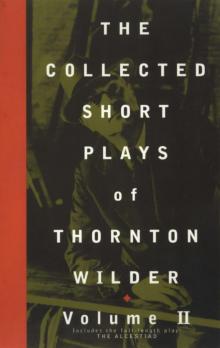 The Collected Short Plays of Thornton Wilder, Volume II
The Collected Short Plays of Thornton Wilder, Volume II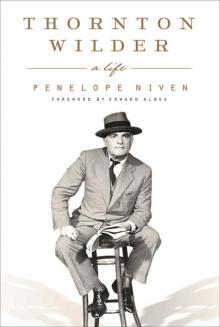 Penelope Niven
Penelope Niven The Selected Letters of Thornton Wilder
The Selected Letters of Thornton Wilder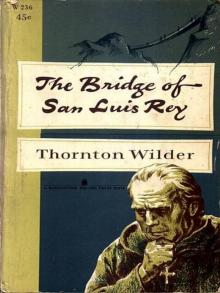 The Bridge of San Luis Rey
The Bridge of San Luis Rey Theophilus North
Theophilus North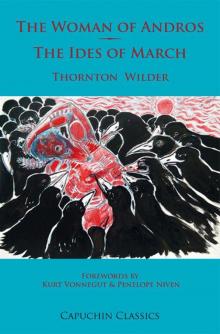 The Woman of Andros / the Ides of March
The Woman of Andros / the Ides of March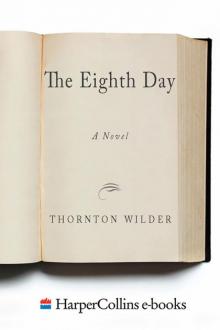 The Eighth Day
The Eighth Day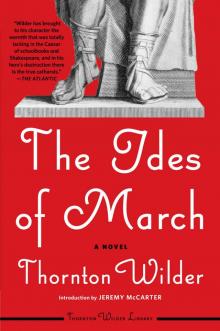 The Ides of March
The Ides of March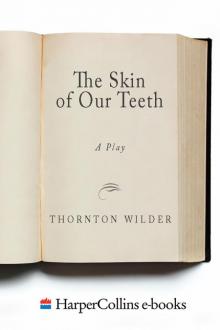 The Skin of Our Teeth
The Skin of Our Teeth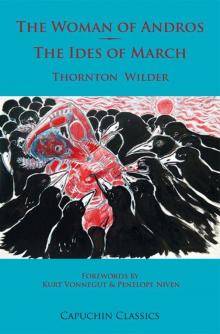 The Woman of Andros and The Ides of March
The Woman of Andros and The Ides of March